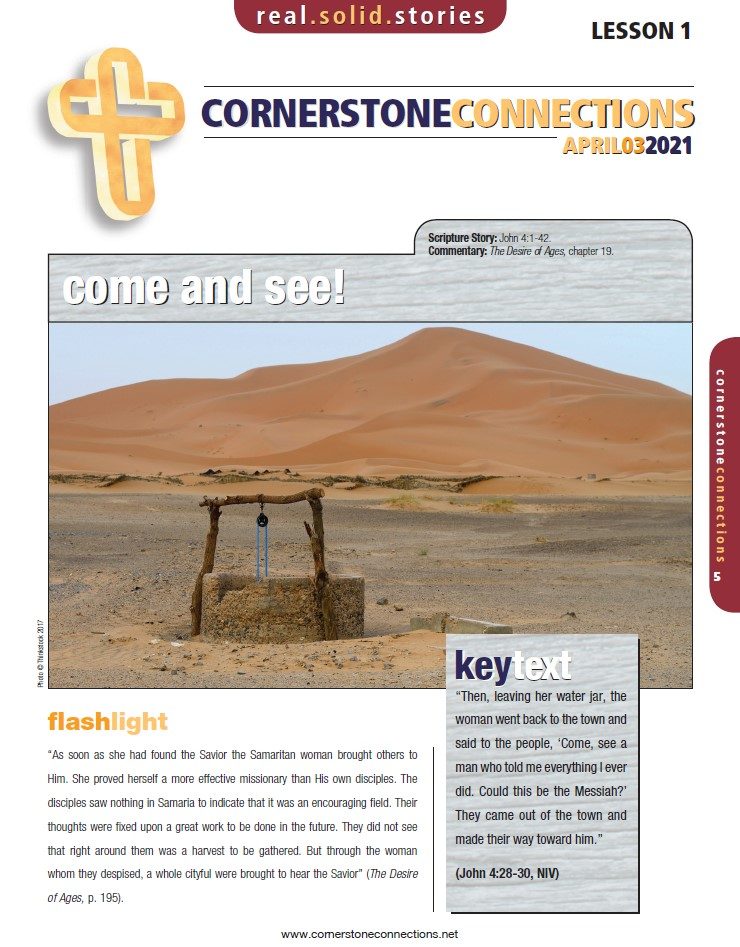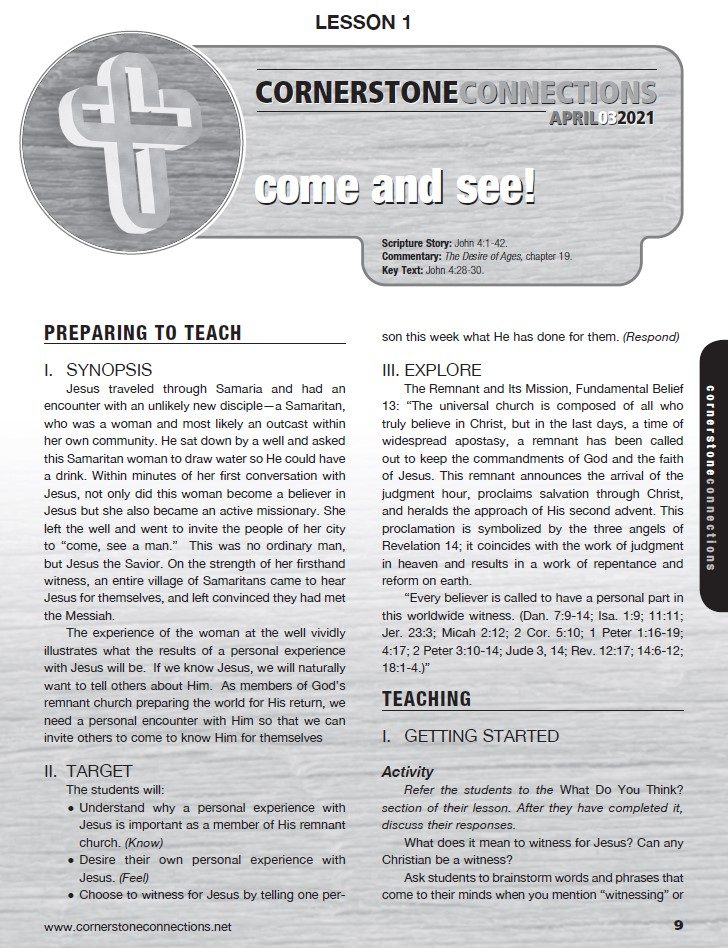Click below to download the Cornerstone Connections leader’s guide and student lesson. This week’s resources also include two lesson plans and a discussion starter video which offer different ways of looking at the topic. Each lesson plan includes opening activities, scripture passages, discussion questions, and real-life applications.
Humble Hero (Desire of Ages)
Chapter 19 - Jesus and the Woman With Five Husbands

On the strength of one woman’s witness, an entire village was convinced that Jesus was the Messiah. Can one person’s story really make a difference?
Scripture Passages
John 4:1-41
OVERVIEW
Well—it’s a deep subject. Imagine being incredibly hungry, thirsty, and tired. It’s been a really long day of walking. You arrive at a deep well only to find there is no way to get water. Imagine the disappointment and longing you might feel. If only there was a way to get to the water. In today’s lesson, Jesus and His disciples find themselves in just such a situation, so grab your water bottle and Bible and let’s dive in.

OPENING ACTIVITY:
THIRST QUENCHER
Supplies: bottle of water
Have each student bring a bottle of water to class or screen.
QUESTIONS
TRANSITION
How important is water? Have you ever asked yourself that question? Sixty percent of your body is water. Seventy percent of the earth is covered in water. Water is vital for us to live, and it is vital for our planet to survive. In today’s lesson, Jesus uses water to describe the gift that He wants to give each of us, so understanding the importance of water to physically survive should give us an understanding of how important Jesus is to our spiritual survival.

BIBLE STUDY GUIDE
Read John 4:1-13.
1 Now Jesus learned that the Pharisees had heard that he was gaining and baptizing more disciples than John—2 although in fact it was not Jesus who baptized, but his disciples. 3 So he left Judea and went back once more to Galilee.
4 Now he had to go through Samaria. 5 So he came to a town in Samaria called Sychar, near the plot of ground Jacob had given to his son Joseph. 6 Jacob’s well was there, and Jesus, tired as he was from the journey, sat down by the well. It was about noon.
7 When a Samaritan woman came to draw water, Jesus said to her, “Will you give me a drink?” 8 (His disciples had gone into the town to buy food.)
9 The Samaritan woman said to him, “You are a Jew and I am a Samaritan woman. How can you ask me for a drink?” (For Jews do not associate with Samaritans.)
10 Jesus answered her, “If you knew the gift of God and who it is that asks you for a drink, you would have asked him and he would have given you living water.”
11 “Sir,” the woman said, “you have nothing to draw with and the well is deep. Where can you get this living water? 12 Are you greater than our father Jacob, who gave us the well and drank from it himself, as did also his sons and his livestock?”
13 Jesus answered, “Everyone who drinks this water will be thirsty again, 14 but whoever drinks the water I give them will never thirst. Indeed, the water I give them will become in them a spring of water welling up to eternal life.”
QUESTIONS
Read John 4:15-26.
15 The woman said to him, “Sir, give me this water so that I won’t get thirsty and have to keep coming here to draw water.”
16 He told her, “Go, call your husband and come back.”
17 “I have no husband,” she replied.
Jesus said to her, “You are right when you say you have no husband. 18 The fact is, you have had five husbands, and the man you now have is not your husband. What you have just said is quite true.”
19 “Sir,” the woman said, “I can see that you are a prophet. 20 Our ancestors worshiped on this mountain, but you Jews claim that the place where we must worship is in Jerusalem.”
21 “Woman,” Jesus replied, “believe me, a time is coming when you will worship the Father neither on this mountain nor in Jerusalem. 22 You Samaritans worship what you do not know; we worship what we do know, for salvation is from the Jews. 23 Yet a time is coming and has now come when the true worshipers will worship the Father in the Spirit and in truth, for they are the kind of worshipers the Father seeks. 24 God is spirit, and his worshipers must worship in the Spirit and in truth.”
25 The woman said, “I know that Messiah” (called Christ) “is coming. When he comes, he will explain everything to us.
26 Then Jesus declared, “I, the one speaking to you—I am he.”
QUESTIONS
Read John 4:27-38.
27 Just then his disciples returned and were surprised to find him talking with a woman. But no one asked, “What do you want?” or “Why are you talking with her?”
28 Then, leaving her water jar, the woman went back to the town and said to the people, 29 “Come, see a man who told me everything I ever did. Could this be the Messiah?” 30 They came out of the town and made their way toward him.
31 Meanwhile his disciples urged him, “Rabbi, eat something.”
32 But he said to them, “I have food to eat that you know nothing about.”
33 Then his disciples said to each other, “Could someone have brought him food?”
34 “My food,” said Jesus, “is to do the will of him who sent me and to finish his work. 35 Don’t you have a saying, ‘It’s still four months until harvest’? I tell you, open your eyes and look at the fields! They are ripe for harvest. 36 Even now the one who reaps draws a wage and harvests a crop for eternal life, so that the sower and the reaper may be glad together. 37 Thus the saying ‘One sows and another reaps’ is true. 38 I sent you to reap what you have not worked for. Others have done the hard work, and you have reaped the benefits of their labor.”
QUESTIONS
Read John 4:39-42.
39 Many of the Samaritans from that town believed in him because of the woman’s testimony, “He told me everything I ever did.” 40 So when the Samaritans came to him, they urged him to stay with them, and he stayed two days. 41 And because of his words many more became believers.
42 They said to the woman, “We no longer believe just because of what you said; now we have heard for ourselves, and we know that this man really is the Savior of the world.”
QUESTIONS

APPLICATION
Our story starts with Jesus and His disciples being hungry and thirsty. Like any good students, the disciples attempt to take care of their master. However, the story takes an interesting twist when Jesus strikes up a conversation with an outcast. There is no mystery why this woman is at the well in the middle of the day—she is avoiding the other people from the village. Jesus and the Samaritan woman have an incredibly deep conversation which convinces her that Jesus is the Messiah. Arriving back, the disciples are a little put out that Jesus doesn’t want their food and drink.
QUESTIONS
FOLLOW UP
Place a bottle of water someplace in your room. Keep it there for a week. Every time you look at it remember the story of the Samaritan woman and ask yourself this question: Do I really want to be thirsty all my life or do I want to accept the offer of Living Water that Jesus has for me?

SCRIPTURE PASSAGES
LEADER’S NOTE
For a Relational Bible Study (RBS) you’ll want to get into the Scripture passage and encourage the youth to imagine participating in the story while it’s happening. Then you will be able to better apply it to your own situation today.
You will need to ask God for the Holy Spirit to be present as your small group discusses the questions (no more than 3-6 people in a group is recommended). Start with the opening question. It is a personal question and the answer is unique for each individual. There is no right answer and nobody is an expert here, so don’t be surprised when you hear different responses. You are depending on the Holy Spirit to be present and to speak through your group. Say what God prompts you to say, and listen to what others share.
Take turns reading the chapter out loud. Follow that with giving the students some time to individually mark their responses to the questions (a PDF version of the handout is available as a download). This gives each person a starting point for responding when you start to share as a group. Next, begin the discussion by asking the students to share what they marked and why on each question as you work your way through. Feel free to take more time on some questions than others as discussion warrants.
Encourage each person in the group to apply what is discussed to their personal lives and to share with the group what they believe God wants them to do. Then ask them to pray that God will help each of them to follow through in doing so. Remind them to expect that God will show them ways to live out the message of this passage in the coming week, and that they are free to ask others in the group to help hold them accountable.
OVERVIEW
Many people are familiar with the story of Jesus and the woman at the well (John 4). After introducing the story, ask for input from your group regarding what they remember about the story and its background from what they’ve heard previously. Based on the feedback you receive, add more tidbits as you choose, such as:
Samaritans came from the 10 northern tribes of Israel. This history included wicked kings like Jeroboam and Ahab (see 1 Kings 12-22). Their capital was Samaria. The Assyrians destroyed the 10 northern tribes and took them captive. These Israelites never returned. The Assyrians mixed the different groups they conquered, so they sent non-Israelites to settle with any leftover Israelite stragglers, leading to a multi-cultural group of people who worshiped a variety of gods, including Yahweh (see 2 Kings 17).
The two southern tribes became known as Judah. Jerusalem and the temple were in this territory. About 100 years later, the people of Judah went into Babylonian captivity, like their relatives had previously. But 70 years later some of them returned as God has promised. They were committed to following Yahweh and not the pagan gods like their ancestors who went into captivity. But when they asked to help rebuild the temple, Nehemiah and Ezra refused their offers, which resulted in friction (Nehemiah 4; Ezra 4).
More than 100 years later the Samaritans built their own temple about 25 miles north of Jerusalem at the base of Mount Gerazim near the town of Shechem. This location is rich in Israelite history. Abraham built an altar there (Genesis 12:6-7), as did Jacob (Genesis 33:18-20), in addition to digging a well that archaeologists indicate matched the place where Jacob purchased land from Shechem. Later, when Moses led the Israelites to the Promised Land, he gave instructions for renewing the covenant at Mount Gerazim, with the ark of the covenant present (Deuteronomy 27:1-26). Joshua did that with the Israelites in Canaan (Joshua 8:30-35). Some think the wilderness tabernacle with the ark was at the base of Mount Gerazim until Eli the priest moved it to Shiloh. Later David moved the ark to Jerusalem. The Samaritans had multiple reasons to consider Mount Gerazim to be a holy place.
More than 100 years before the time of Christ, following the Bar Kokhba revolt against the Romans, John Hyrcanus, the leader of the next generation, went on a military campaign that included the area of Mount Gerazim. He destroyed the Samaritan temple there since the Jews believed it was a corrupt temple in contrast to their temple in Jerusalem.
The Samaritans had reasons to hate the Jews, and the Jews continued to distance themselves from the Samaritans because they belonged to a mixed race that included a combination of worship to Yahweh and pagan idols. Samaritans were not allowed in the temple in Jerusalem, and no Jew would marry a Samaritan.
Jewish society at this time was patriarchal—meaning men were elevated above women rather than on equal footing. The woman at the well wasn’t on equal footing with other women in Samaria who would draw water in the morning and evening. She went to the well in the middle of the day when nobody would be present. But she did have Jacob’s well and she had a bucket to get water. She also had Mount Gerazim with its former temple even though she didn’t have Jerusalem with its current temple. She was quite experienced when it came to marriage (five husbands), and when she talked to Jesus, she was living with a man outside of marriage, further lowering her social position. With the symbolism of numbers, Jesus was the seventh man of significance in her life—the perfect man!
The theological argument she began pitted Mount Gerazim with Jerusalem. Jesus countered that Samaritans knew so little about their own worship and that salvation came through the Jews. But He transitioned to the irrelevance of location because the worship that matters is the life (spirit) of the believer, not the location of the believer. And that’s the “truth” as in “spirit and truth.”
Pick and choose which of these items you may want to share. Don’t spend so much time with the context that you miss the study, but do give some context to deepen the meaning of the story.
With that, you’re ready for the introductory question that levels the playing field so nobody is more of an expert than anyone else. You’re all dependent on the presence of the Holy Spirit to speak to the group through the Bible passage found in John 4:1-42.
Well Done
Where do you go to get away from people? How often do you go there?
Read John 4:1-42.
1 Now Jesus learned that the Pharisees had heard that he was gaining and baptizing more disciples than John—2 although in fact it was not Jesus who baptized, but his disciples. 3 So he left Judea and went back once more to Galilee.
4 Now he had to go through Samaria. 5 So he came to a town in Samaria called Sychar, near the plot of ground Jacob had given to his son Joseph. 6 Jacob’s well was there, and Jesus, tired as he was from the journey, sat down by the well. It was about noon.
7 When a Samaritan woman came to draw water, Jesus said to her, “Will you give me a drink?” 8 (His disciples had gone into the town to buy food.)
9 The Samaritan woman said to him, “You are a Jew and I am a Samaritan woman. How can you ask me for a drink?” (For Jews do not associate with Samaritans.)
10 Jesus answered her, “If you knew the gift of God and who it is that asks you for a drink, you would have asked him and he would have given you living water.”
11 “Sir,” the woman said, “you have nothing to draw with and the well is deep. Where can you get this living water? 12 Are you greater than our father Jacob, who gave us the well and drank from it himself, as did also his sons and his livestock?”
13 Jesus answered, “Everyone who drinks this water will be thirsty again, 14 but whoever drinks the water I give them will never thirst. Indeed, the water I give them will become in them a spring of water welling up to eternal life.”
15 The woman said to him, “Sir, give me this water so that I won’t get thirsty and have to keep coming here to draw water.”
16 He told her, “Go, call your husband and come back.”
17 “I have no husband,” she replied.
Jesus said to her, “You are right when you say you have no husband. 18 The fact is, you have had five husbands, and the man you now have is not your husband. What you have just said is quite true.”
19 “Sir,” the woman said, “I can see that you are a prophet. 20 Our ancestors worshiped on this mountain, but you Jews claim that the place where we must worship is in Jerusalem.”
21 “Woman,” Jesus replied, “believe me, a time is coming when you will worship the Father neither on this mountain nor in Jerusalem. 22 You Samaritans worship what you do not know; we worship what we do know, for salvation is from the Jews. 23 Yet a time is coming and has now come when the true worshipers will worship the Father in the Spirit and in truth, for they are the kind of worshipers the Father seeks. 24 God is spirit, and his worshipers must worship in the Spirit and in truth.”
25 The woman said, “I know that Messiah” (called Christ) “is coming. When he comes, he will explain everything to us.”
26 Then Jesus declared, “I, the one speaking to you—I am he.”
27 Just then his disciples returned and were surprised to find him talking with a woman. But no one asked, “What do you want?” or “Why are you talking with her?”
28 Then, leaving her water jar, the woman went back to the town and said to the people, 29 “Come, see a man who told me everything I ever did. Could this be the Messiah?” 30 They came out of the town and made their way toward him.
31 Meanwhile his disciples urged him, “Rabbi, eat something.”
32 But he said to them, “I have food to eat that you know nothing about.”
33 Then his disciples said to each other, “Could someone have brought him food?”
34 “My food,” said Jesus, “is to do the will of him who sent me and to finish his work. 35 Don’t you have a saying, ‘It’s still four months until harvest’? I tell you, open your eyes and look at the fields! They are ripe for harvest. 36 Even now the one who reaps draws a wage and harvests a crop for eternal life, so that the sower and the reaper may be glad together. 37 Thus the saying ‘One sows and another reaps’ is true. 38 I sent you to reap what you have not worked for. Others have done the hard work, and you have reaped the benefits of their labor.”
39 Many of the Samaritans from that town believed in him because of the woman’s testimony, “He told me everything I ever did.” 40 So when the Samaritans came to him, they urged him to stay with them, and he stayed two days. 41 And because of his words many more became believers.
42 They said to the woman, “We no longer believe just because of what you said; now we have heard for ourselves, and we know that this man really is the Savior of the world.”
1. Why did Jesus ask the woman for a drink of water?
2. What might the woman have thought when she first talked with Jesus?
3. What did Jesus and the woman cover when talking about religion?
4. What do you say about your religion when talking with others?
5. How did the woman convince the townspeople to follow her to Jesus?
6. What did Jesus mean when He said it was time to harvest now?
7. How does the example of Jesus with the woman at the well challenge you to relate to others?
8. The people in the town eventually called Jesus “the Savior of the world.” Why do you believe that Jesus is the Savior of the world today?
SUMMARY
Two weeks ago our lesson covered Jesus engaging with Nicodemus, one of the most respected religious leaders of his day. This week Jesus encounters the opposite—a Samaritan woman who has had five marriages and currently lives with a man who is not her husband. This is early in His ministry, but already Jesus has broken down the barriers between Jews and Samaritans, between genders, and between social classes. Jesus is not dependent on His disciples for evangelism since a Samaritan woman brought the whole town to Him. And while it seemed He was dependent on others for food and water, it turns out that He wasn’t. And Jesus stayed with the Samaritans for multiple days, making that His current mission field.

APPLICATION
Here are a few application ideas for you to move from Sabbath School into action this coming week. Feel free to adapt this as the Holy Spirit moves you, but, by all means, apply this Scripture study to your life in the coming week and month.
Who knows you—really, really knows you? Does your best friend? Do your parents? Your Sabbath School teacher/leader? What if you change? Do you even know yourself now?
No Jew would talk to the Samaritan woman at the well, but Jesus did. Who is someone you would never talk to because you see yourself as being in a completely different category? This could be someone close to your age or very different from your age, but it should be someone you simply don’t associate with because they’re so different from you.
The woman at the well, someone who didn’t seem to have any friends, brought the entire town to see Jesus.
When the woman at the well had challenging questions for Jesus, He responded with challenging questions (and answers) of His own. And then He directed her to something even grander than her questions.
Try this yourself. If you need help identifying challenging questions, check out the Qs 4 U discussion cards from AdventSource:
Learn More and Purchase
Here are a few examples:




